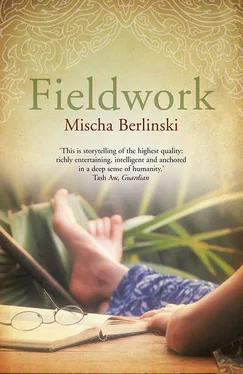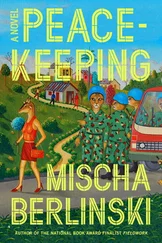Piers and Martiya van der Leun left Sulawesi in 1954, and Piers spent the remainder of his career at Berkeley. I learned this from Piers's obituary, published in the Daily Californian , May 1987. The van der Leuns lived in a Craftsman house on elm-shaded Etna Street. Piers continued his research, returning every other year to Indonesia, but passed most of his days on the twelfth floor of Dwinelle Hall, revising his verb tables and refining his lexicon. The lexicon was published in 1967, and was praised by a reviewer in the Bulletin of Oriental Linguistics as a "significant step forward in Australasian linguistics." From his old office, one can see the Bay Bridge and San Francisco; a bay view was a mark of status and distinction within the department.
I visited the former chairman of the department of linguistics, who, despite advanced age, still kept office hours. He greeted me with a strange exuberance when I knocked on his door, and I had the impression that very few people visited him between two and four on Wednesdays. He had bulging black eyes. He recalled Piers van der Leun and Martiya, but I began to doubt the quality (if not the quantity) of his memories when he referred to Piers as an Indo-Europeanist, and Swiss. If the former chairman's other recollections are accurate, Piers played tennis quite a bit and introduced Martiya to the game. The university in the 1950s, the former chairman digressed, was an entirely different place from the university today: young ladies wore tennis skirts and young men dressed neatly, often with a tie, carrying their tennis rackets over their shoulders as they left the fraternity house, but of course wearing white shorts on the courts as university regulations demanded. Occasionally, someone might show up in class still wearing tennis clothes. This was frowned upon, but nobody saw the need officially to forbid the act.
A long silence passed, which I assumed the former chairman spent in the organization of his unruly memories. I glanced around his office. One wall was covered in books, another in photographs, many of them showing the chairman shaking the hands of famous people — I would have asked the chairman how he came to meet both Ronald Reagan and Frank Sinatra, but I was afraid that he would have no more idea than I did.
Martiya perhaps attended the local junior high school, then Berkeley High School, then might have matriculated at the university. The former chairman had remarkable tufts of hair protruding from his magisterial, elephantine ears. He suggested I speak with his daughter, "my oldest girl," who had known Martiya slightly better, the two having graduated hypothetically in the same class at high school. The former chairman asked me which university I was associated with, and looked at me blankly when I explained that I was interested in the life of Martiya van der Leun. "Ah, yes," he said finally. "Wasn't she old Piers van der Leun's daughter?" When I said goodbye, he wished me luck on my grant application. A quick Internet search revealed that the former chairman had a linguist's mastery of the grammars of all the Indo-European languages, and had published new results within the last year.
The chairman's daughter lived in Boston. When I got her on the phone, she confirmed the general outlines of Martiya's career — it is amazing the things people will tell a polite stranger — and then said something about it being the crazy time of the year, with the holidays and all. Martiya's name came brightly to her lips, as if Martiya had been one of those high school personalities it is impossible to forget. Every high school has one. Martiya had indeed graduated in her class at Berkeley High and then matriculated at UC Berkeley. A cell phone was ringing in the background, and I could hear a small child crying. "I've got to run ," she said. She took my e-mail address and, to my surprise, wrote me the next day, just a few lines suggesting that I speak with Martiya's college boyfriend Tim Blair, today a professor of English at San Francisco State University.
A lot of journalism is like this: I felt a little like the baton in a relay race of faulty memories and distant recollections. But Tim Blair remembered Martiya very, very well. I could sense it even over the telephone. "Holy shit," he murmured when I told him that Martiya was dead, a suicide in a Thai jail. He invited me to coffee at his house on Potrero Hill.
Tim Blair and I sat in his book-lined study. There were rectangular piles of handwritten papers on the floor around his desk ("Don't mind my ball and chain," he said, gesturing at the papers ruefully. "I'll get this thing out of here one of these days") and photographs of his sons on the wall. Tim Blair settled himself onto a leather couch covered with an afghan, and I was assigned to an easy chair. He stroked his silver beard slowly; his mustache dangled across his upper lip. He was one of those men with a well-formed skull suited to baldness, the kind of skull that under exceedingly different circumstances might have made an excellent calabash, smoothly rounded and long in the forehead with a deep bowl sufficient for a good many draughts of palm wine. There was something just a little aggressive about Tim Blair and the way he hunched his elbows on his knees. He chewed his pink lower lip.
"Tell me," I finally said, the "tell me" an interrogatory trick — I was relying here on Barbara Walters's How to Talk to Practically Anyone About Practically Anything —to win my subject's trust. "Tell me," I repeated, making good focused Barbara-counseled eye contact, "how did you come to know Martiya?"
Tim Blair looked at me severely for a second. I thought that perhaps I had mispronounced her name. He crossed his legs and cracked his knuckles. I had a small notebook balanced on my knee. "You know she voted for Nixon, don't you?" he said finally. "Christ, man, that blew me away."
"Nixon?" I wasn't sure where all this was going, but I wrote "Nixon" in my notebook, and underlined it.
"Twice."
"Twice?"
"She voted for the bastard twice ."
I added an exclamation mark after the word "Nixon."
Tim continued, "Hell, she was just a shade shy of the goddamn John Birch Society. She said that her granddad was killed by Communists and she didn't want to see all of Southeast Asia red. She was the kind of kid who got pretty heated up about politics. We'd walk through campus and she just went after the peace protesters."
He uncrossed his legs and leaned back into the sofa. "One time, I remember, we were in the Anthropology Department lounge and this guy was talking about the Montagnards in Vietnam, and he was running off at the mouth, attacking American policy, calling it genocide and all that. She went after him. ‘Why the hell do you think the Hmong are fighting for us ?' she asked him. ‘Do you think they're stupid? Do you think they don't know what's in their best interests?' He just looked at her blankly, this guy, staring at this dark-haired girl, saying what you just did not say in the Anthropology Department at Berkeley in those days. She was vicious and smart, and that was sexy." Tim lingered on the word "sexy." "I was the idiot who was running off at the mouth. That's how I met her, that's when I fell for her. Boom! She never held it against me that I was an idiot. But she really believed what she was saying. She said that the first thing the Communists were going to do when they took over was to drag all the indigenous people down from their villages and put them on communal farms. Or shoot 'em. And it was true. It was the first thing they did."
Tim continued without further prompting. I scribbled as quickly as I could. In college, Tim and Martiya were both anthropology majors. They were together, hardly a minute apart, most of their junior and senior years. Tim made clear that it was all a long time ago, and yet the memories of his time with Martiya were still charged, perhaps precisely because it was a long time ago and these were the memories of his youth. Every now and then I interrupted Tim, asking him for details about their time together, looking for something that would make Martiya come to life. But those novelistic touches were in his telling hazy and indistinct. For reasons Tim could not quite articulate, a course in the ethnology of southern India was a particularly romantic memory. They took a lot of naps on the college lawns, and when they woke up they spent long hours playing with her hair. "Being with Martiya, you got to realize that it was kind of like a ménage à trois. Her damned hair had a will of its own. One day it's flat and the next it's big, and everything about her changed, depending on the hair."
Читать дальше












